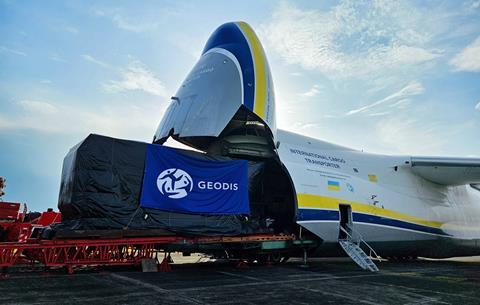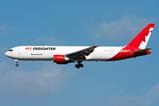
Geodis has completed a complex air cargo transport project featuring oversized thermocompressors that involved 13 flights over seven days using an Antonov AN-124, the world's largest cargo aircraft.
The just-in-time logistics operation entailed transporting 249 pieces of oversized, overweight cargo totalling 776 tons and 4,455 cu m to southeast Colombia.
Geodis originally planned to mobilise the cargo in Cartagena and transport it to the end destination via the La Orquídea Bridge in Boyacá, the only road transport option for freight of this size and weight along the route.
However, when the bridge collapsed in August last year, Geodis had to develop and execute an alternative solution to transport the cargo via air.
"With 13 total flights, including a long international journey and 12 domestic trips, this unprecedented operation faced consistent challenges to overcome," said Carlos Palacios, manager director of Geodis in Colombia.
"Despite the complexities, our team at Geodis and our collaborators—including Antonov, the Colombian Air Force and the individual airports involved—were able to successfully come together to keep essential materials moving across the country at a critical time for our client's operations."
Geodis identified the Antonov AN-124 as the only aircraft option that would be large enough to mobilise the cargo given its extra dimension and weight characteristics.
The planning process included securing the aircraft given its limited availability amid the Russia-Ukraine conflict and its use in humanitarian aid operations.
The freight forwarder also evaluated and defined specific airports that would meet the technical conditions required to manoeuvre this type of aircraft, choosing Barranquilla (AOL) in the north of the country and Apiay (AOD) in the centre of the country.
Additionally, in Apiay, which is a military base for the Colombian Aerospace Force, Geodis facilitated a study to determine the correct manoeuvres for landing and takeoff, the location of the aircraft so as to not interrupt military base operations, plus fuel supply capacity and the availability of an alternate facility during ground time.
The cargo was prepared in Cartagena and transported by land to Barranquilla before being transported on the Antonov AN-124.
While the Antonov AN-124 has a capacity of 100 tons, the maximum payload accepted was 65 tons to land in Apiay. Geodis said this limitation saw it make adjustments to the flight plans and load with Antonov, which ultimately meant transporting the cargo over 12 domestic flights.
Geodis and Antonov adjusted the load to mobilise the 12 separate pieces, including removing crates from the parts, placing 12 additional lashing points inside the aircraft and removing stairs to fit the biggest piece of cargo onto the plane.
"Given the constant changes, urgency of timeline and sensitive nature of the cargo, this project marks one of the biggest accomplishments for our GEODIS in Colombia team," said Palacios.
https://www.aircargonews.net/freight-forwarder/e-commerce-bolsters-geodis-capacity/
https://www.aircargonews.net/policy/environment/geodis-sets-new-emissions-reduction-targets/
https://www.aircargonews.net/freight-forwarder/geodis-to-continue-operating-own-capacity/















